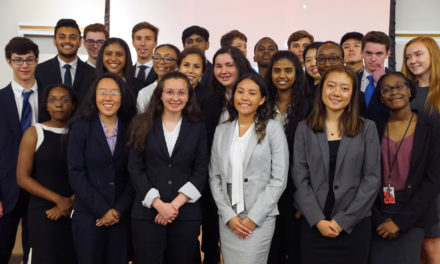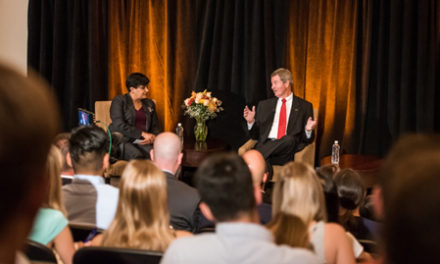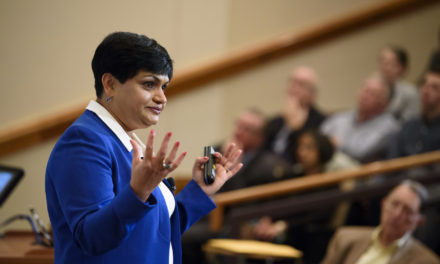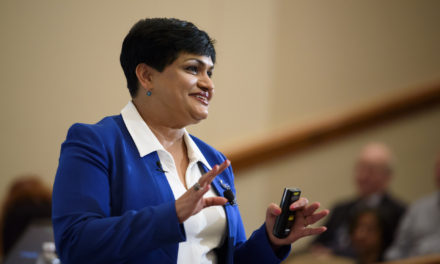How to empower students to live intentional lives
How to empower students to live intentional lives

When erecting tall, strong buildings, structural engineers know that pillars are essential for withstanding heavy gales and intense earthquakes. The same principle applies to building an intentional life.
Within the Intentional Life Lab at the Ed Snider Center for Enterprise and Markets, University of Maryland students learn how they can harness the power of human enterprise by leading themselves and others to solve problems they find personally meaningful within collaborative, win-win relationships.
The six pillars of an intentional life
Sarah Wolek, the Lab director, uses a six pillar approach to create a grid for life’s decisions, both practical and profound. Life-long learners quickly realize that to develop their personal “why” and “how” for leading an authentic life, each of the six pillars is essential—if one is missing, it weakens the structure.
The three “me” pillars—Purpose, Wellness, and Prosperity—connect our goals to ourselves. Together they create self-responsibility and self-accountability. The three “us” pillars—Relationships, Community, and Nature—connect our goals to our world. Together they create consonance with the people in our life and the places we inhabit.
Defining your purpose identifies the values that guide an individual’s life. It enables development of character and integrity, guides actions, and guards against inner and outer conflicts. Attaining wellness fosters both physical and mental health. It integrates goals related to self-help and self-care, guides choices of activities and lifestyles, and provides the mainstay for relationships with others. Achieving prosperity defines yardsticks for measuring success. It integrates goals of financial independence and self-esteem, serves to harmonize reasons with rewards, and optimizes on an individual’s aspirations and ability.
Sustaining meaningful relationships begins with identifying who one chooses to have in their life, professionally or personally. It honors each individual as an independent equal, fosters kindness over niceness, and provides win-win benefits for a healthy, long-term partnerships. Creating a community focuses on shared values. It integrates individuals across race, religion, ethnicity, and national origin, and provides opportunities for organizations and societies to learn and grow together. Connecting with nature creates harmony with our surroundings. Nature nourishes us as we nourish our physical world, guides activities that create emotional, physical, and intellectual wellbeing, and provides the space to integrate the other pillars of our life.
Experiential learning opportunities for students, across majors and careers
The above six-pillar approach undergirds the experiential learning opportunities we provide across majors and careers.
High-school students at the cusp of adulthood can enroll in the Snider Enterprise & Leadership Fellows (SELF) summer program, a three college-credit bearing course. The course empowers them to think of themselves as CEO of My Enterprise, Inc. by defining their purpose, identifying what success means for themselves, creating their value proposition, and fostering meaningful relationships that create mutual value. A highly engaging experience, students work in teams to envision and pitch solutions to problems they identify within their world.
College freshmen and sophomores often struggle to lead themselves, particularly if they are undecided on their major and career. Even students certain of their career interests may be unduly influenced by parental or peer pressures. Victor Mullins, Associate Dean of Undergraduate Studies at Maryland Smith, notes, “Our graduates have a 99 percent placement rate, often at leading firms and with impressive starting salaries. But, a significant fraction of them find themselves unfulfilled a few years later. Most of them had never stopped to ask themselves: why do I want to pursue this major or career?”
To help them find their why, the Lab offers five courses: Intentional Self, The Future of You, Business and Society, Choosing Your Major and Career, Careers of Impact, and Intentional Leader. Within each of these courses, students engage in a process of self-discovery and recognition of all potential opportunities.
“A career choice can’t be made in isolation,” says Wolek. “It is ideally a reflection of your whole self—an understanding of which is only developed with intention. Students taking these courses center their academic and professional efforts around their authentic self while broadening their life vision beyond their career.”
The same principle permeates for Masters students, particularly those with several years of experience. These individuals seek not only to acquire specialized skills, but to reimagine themselves and become impactful leaders. Within the Masters in Management, the lab provides a course on Purposeful Leader. For executives seeking an MBA, the Lab integrates across coursework and stand-alone sessions to create a 15-month immersive experience that helps them envision and enact a personal, purposeful journey.
Creating scale and impact by enacting higher education’s purpose
The Lab started just two years ago, but its courses are already being integrated into the mainstream of the University of Maryland student experience. Each course is first developed and piloted to ensure students can excel in a nurturing environment. In subsequent semesters, there is attention to scaling through partnerships with schools and programs, and by increasing enrollment capacity through a “train the trainer” model. The Intentional Self already has been approved as a general education requirement, a critical designation to ensure that all students in the university can benefit from access to the course.
Higher education institutions have the noble purpose of enabling upward mobility of its students, in intellectual, psychological, and economic realms. Through innovative curriculums that create the frameworks for intentionality, higher education can empower free and creative individuals who, driven by self-motivation, passion, and a positive approach to trading value for value, make the world a better place.
Agarwal is the Rudolph Lamone Chair of Strategy and Entrepreneurship and Director of the Ed Snider Center for Enterprise and Markets at the University of Maryland. She studies human enterprise as the key engine to personal fulfillment, evolution of firms and industries, and socio-economic prosperity and growth.
This viewpoint is part of an ongoing series, Driving Transformation. In this series, we amplify the voices of a diverse group of scholars, nonprofit leaders, and advocates who offer unique perspectives on the intersection of work and learning.




